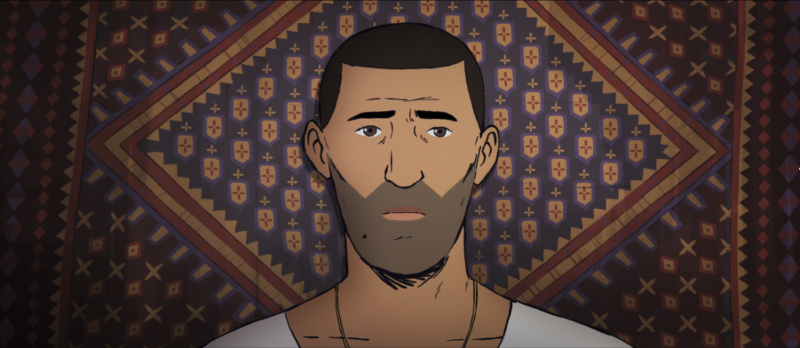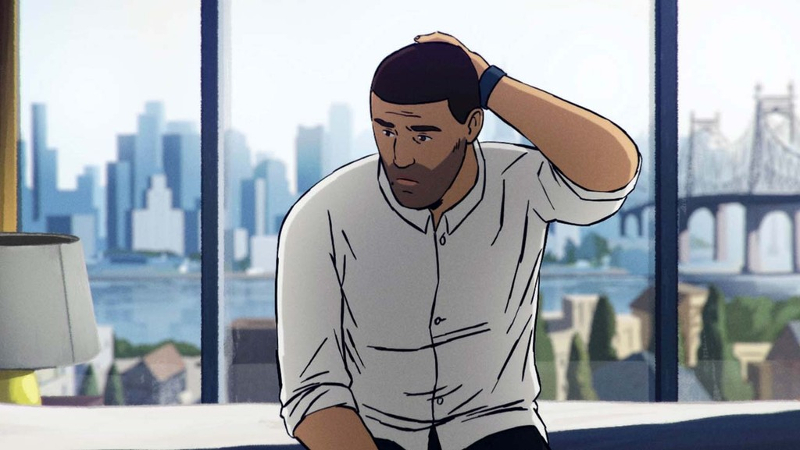Director – Jonas Poher Rasmussen – 2021 – Denmark, France, Norway, Sweden – Cert. 15 – 83m
****
In a series of interviews, a gay man now living in Denmark tries to explain his experience of fleeing Afghanistan – in cinemas from Friday, February 11th
Like The Breadwinner (Nora Twomey, 2017) and The Swallows Of Kabul (Zabou Breitman, Eléa Gobbé-Mévellec, 2019) before it, this is an animated film about life in Afghanistan under the Taliban. At the same time, it’s very different from those films for three reasons.
One, it details not so much the experience of life under the Taliban but the refugee experience of getting out of the country and its psychological aftermath on those who manage to get out.
Two, its central character is not fictional but real, the film being to all intents and purposes a documentary.
Three, although the film incorporates live action archive footage at various points, it’s essentially structured around an interview, visually represented in animation, in which the refugee subject recounts his experiences which are brought to life in a highly effective 2D animation as he speaks.
The style of the animation is almost perfunctory, a far cry from The Breadwinner’s colourful, detailed and rounded rendering which enable meshing with mythological storytelling and an equal distance from The Swallows Of Kabul’s pastel shades which so brilliantly convey a romance doomed by the circumstance of the regime.
It isn’t an artist’s work showcasing their particular, personal, idiosyncratic style like Persepolis (Marjane Satrapi, 2007) although the autobiographic element of escaping a repressive regime, in that case post revolution Iran, is not dissimilar. Flee is closer to two animated films about North Korea which use animation almost as a tool in the documentary film-maker’s box, the gruelling True North (Eiji Han Shimizu, 2020) and the even harder hitting Camp 14: Total Control Zone (Marc Wiese, 2012).
Danish gay man Amin (not his real name, apparently) has never come completely clean about how he got from Afghanistan to Denmark, but with his marriage to longtime partner Kasper fast approaching, he’s persuaded by a radio journalist friend to be interviewed about it. In tandem with observations on the difficulties of his current relationship, he starts to spill the beans of the details involving a childhood where, as a boy, he would happily run around Kabul wearing his sisters’ dresses. Things changed later when he witnessed friends being taken away to join the army.

The family manage to get out, flying to Moscow after the fall of Soviet Communism to be confronted with largely empty supermarket shelves. Much time is spent in their high rise apartment watching Russian-dubbed, Mexican soap operas. Amin’s big brother Abbas lives in Sweden, but the cost of getting there illegally is prohibitive: $3 000 each to the traffickers.
At one point some 64 people are crammed into a freight container loaded onto a ship hemmed in by other containers all around.
At another, Amin finds himself caught by the corrupt Russian police along with two other people. One is a girl who the policemen rape in the back of a van. For years afterwards, he will berate himself for not having stood up to save her, although in his position of powerlessness it’s difficult to know exactly what he might have done.
Further harrowing sequences include people sealed into the hold of a ship at sea with water coming in to the vessel and a group walk though a forest where their trafficker guide jokingly threatens to one of the men that if the old woman he and others are carrying can’t keep up, he’ll put a bullet through her head. He’s unaware that the man to whom he’s speaking is the woman’s son.
The film’s great strength is that it captures the refugee experience and puts it on the screen for those of us who’ve not lived it. For some of the darker, more abstract description this involves the use of highly effective, animated charcoal drawings. It’s not the easiest film to watch, but the use of animation makes it much easier to take and the film deserves to be widely seen.
Flee is nominated for Best International Feature Film in the 2021/22 (94th) Oscars as well as Best Animated Feature Film and Best Documentary Feature.
Flee is out in cinemas in the UK from Friday, February 11th.
Read my alternative review for Reform magazine, February 2022.
Trailer:
Flee was previously out in cinemas in the UK and on BFI Player as part of the BFI London Film Festival 2021 which ran from Wednesday, October 6th to Sunday, October 17th in cinemas and on BFI Player.
Awards (selected)
2021-22
Oscars
Best Documentary Feature (nomination)
Best Animated Feature Film(nomination)
Best International Feature Film (Denmark) (nomination)
BAFTAs
Best Documentary (nomination)
Best Animated Feature Film(nomination)
2021
Annecy International Animation Festival
Cristal for a Feature Film
Gan Foundation Award for Distribution
Best Original Music Award for a Feature Film, sponsored by the SACEM
